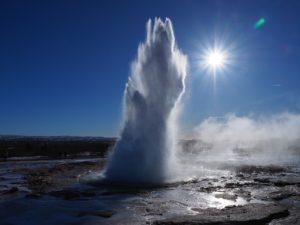
There are 3 basic prayers: Help. Thanks. Wow.
So says Anne Lamott in her book HELP THANKS WOW – The Three Essential Prayers. Below is the gist of her book. All quotes are hers.
Keep it simple – “God can handle honesty, and prayer begins in honest conversation. My belief is that when you are telling the truth, you are close to God.”
Help – “Help us walk through this. Help us come through. It is the first great prayer.” “Praying ‘Help’ means that we ask the Something give us the courage to stop in our tracks….”
Thanks – “You say, Thank you for lifting this corner of the curtain so I can see the truth, maybe for just a moment, but in a way that might change my life forever.” “To have been so lost that you felt abducted, to feeling found returned, and set back onto you feet: Oh my God, thank you – thankyouthankyou. Thank you. Thanks.”
Wow – “‘Wow’ means we are not dulled to wonder. We click into being fully present where we’re stunned into that gasp…’Wow’ is having ones mind blown by the mesmerizing or the miraculous: the veins in a leaf, birdsong, volcanoes.”
Why pray? – C.S. Lewis wrote: “I pray because I can’t help myself. I pray because I’m helpless. I pray because the need flows out of me all the time, waking and sleeping. It doesn’t change God. It changes me.”
“Those are the basic instructions, to which I can add only: Amen. Let it happen!”
 I can match you. Without even trying. It’s pure instinct for an empath. My emotions will rise up to meet and mix with yours. It’s crazy scary but exciting for a young empath. As you get older, you can learn to recognize the green lights and the red flags and where each encounter is likely headed. We can choose to lean in or get away. Because when your emotions become ours, it changes us. Simpatico cool and good. OR simpatico creepy and scary. That’s why we need to be careful who we spend time with. If your emotions bleed into us, does it make us feel energized or exhausted? Depends on the emotion.
I can match you. Without even trying. It’s pure instinct for an empath. My emotions will rise up to meet and mix with yours. It’s crazy scary but exciting for a young empath. As you get older, you can learn to recognize the green lights and the red flags and where each encounter is likely headed. We can choose to lean in or get away. Because when your emotions become ours, it changes us. Simpatico cool and good. OR simpatico creepy and scary. That’s why we need to be careful who we spend time with. If your emotions bleed into us, does it make us feel energized or exhausted? Depends on the emotion.

 Geysers are beautiful, but you don’t want to feel like one.
Geysers are beautiful, but you don’t want to feel like one.
 You never appreciate your body and your health more than after you have been sick. Recovery sparks gratitude. We realize how much we take for granted that our bodies will continue to function, and function well, day after day, week after week, month after month, and year after year.
You never appreciate your body and your health more than after you have been sick. Recovery sparks gratitude. We realize how much we take for granted that our bodies will continue to function, and function well, day after day, week after week, month after month, and year after year. “If you are tired, learn to rest, not to quit.” – Banksy.
“If you are tired, learn to rest, not to quit.” – Banksy. Highly sensitive people have highly sensitive senses. Makes sense? Of course.
Highly sensitive people have highly sensitive senses. Makes sense? Of course.
